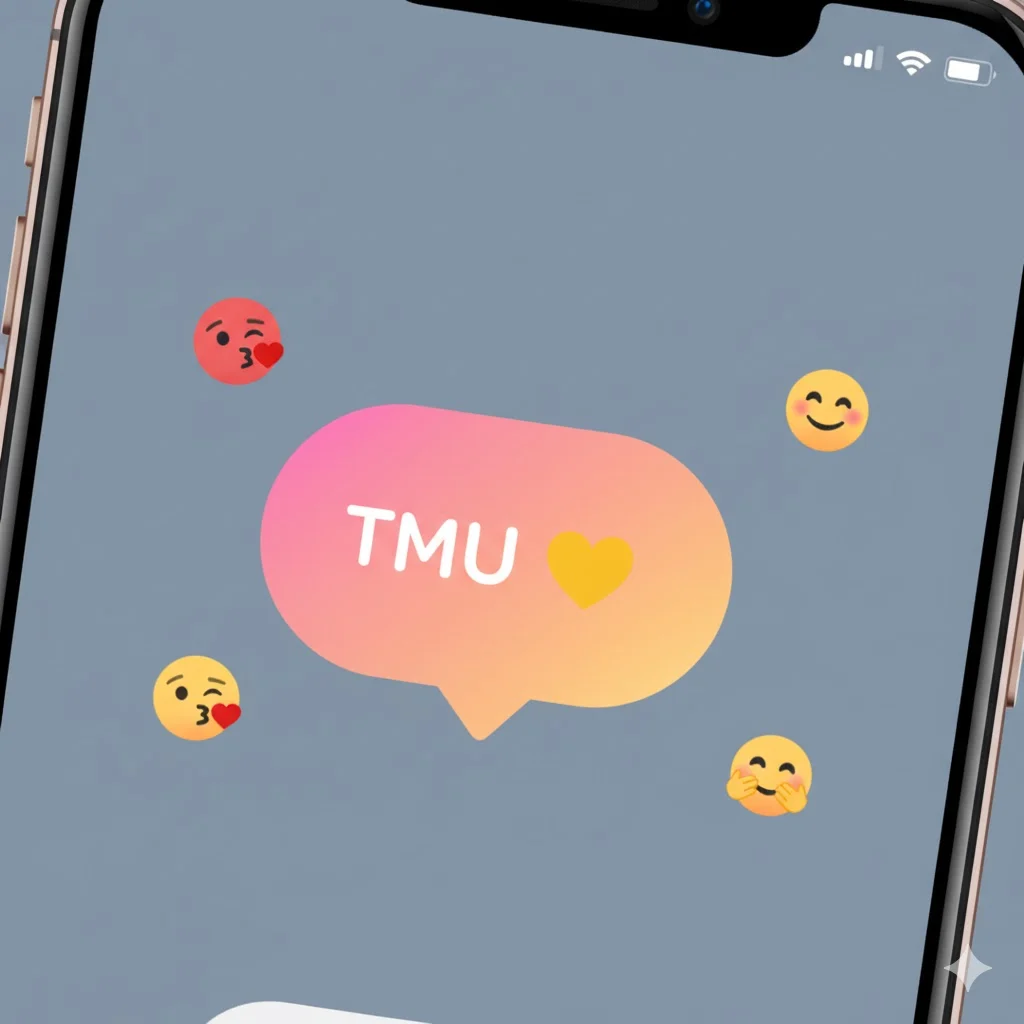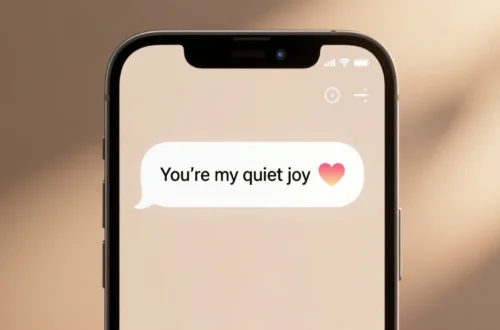Hey there! 👋 If you’ve ever been texting, scrolling social media, or chatting in an online game and spotted “TMU”, you might have paused and wondered, “What does that even mean?”
Whether you’re a casual texter, a gamer, or a social media enthusiast, knowing TMU can save you confusion and even help you respond naturally in conversations. Slang like TMU appears everywhere — from Twitter replies to WhatsApp group chats, and even in dating apps.
This post is written specifically for you — the curious texter or online communicator who wants to stay in the loop. We’ll break down what TMU means, where it comes from, how it’s used, potential misunderstandings, and how to respond appropriately. By the end, you’ll be confident spotting or using TMU in any digital conversation.
Definition & Meaning
So, what does TMU mean in text?
TMU is an abbreviation for “Thinking of You.”
It’s a quick, informal way to let someone know they’re on your mind.
In conversations, TMU is often used to show care, affection, or concern without writing a full message. It’s a friendly or flirty shorthand depending on context.
Examples in Real Conversations
Alex: “TMU 😘”
Sam: “Aww, thanks! You just made my day.”
Friend 1: “TMU! Hope your meeting went well.”
Friend 2: “Thanks, I really appreciate it 😊”
Gamer A: “TMU, let’s catch up after the match.”
Gamer B: “Will do! 💬”
In all cases, TMU communicates thoughtfulness quickly and efficiently. It’s like sending a virtual nod saying, “I’m thinking about you.”
Background & History
TMU comes from modern digital shorthand, part of a long line of abbreviations designed to make texting and chatting faster.
Short phrases like TMU became popular in the early 2000s with SMS texting, instant messaging platforms, and later social media apps. People wanted a quick way to show care or connection without writing a full sentence.
Unlike slang like NMMS, TMU is universally friendly and not tied to any specific region or culture. Its simplicity makes it perfect for casual texting, online chats, and social media.
Over time, TMU has been adopted in various online spaces, from Instagram DMs to Snapchat streaks and even dating apps, as a small but meaningful way to show attention or affection.
Usage in Various Contexts
TMU can be used in multiple ways depending on your audience.
1. Casual Texting
Friend: “TMU! How was your day?”
You: “Thanks! It was good, busy but productive 😊”
A quick TMU here adds warmth without taking up much time.
2. Social Media
On Instagram or Twitter, TMU might appear in replies or comments:
- “TMU! Hope you’re having a great day 💛”
- “Just saw your post — TMU!”
It acts like a thoughtful reaction without writing a full paragraph.
3. Gaming Chats
Player 1: “TMU, wanna squad up later?”
Player 2: “Sure! Can’t wait 🎮”
Even in fast-paced gaming conversations, TMU communicates care or attention efficiently.
4. Dating Apps
“TMU 😉”
This can signal interest or affection without being too forward. Tone and emojis can make it flirty, friendly, or supportive.
Common Misconceptions & Clarifications
Even simple abbreviations like TMU can be misunderstood.
❌ Misconception 1: TMU is Romantic Only
Not true. TMU can be friendly, familial, or romantic — it depends on context and relationship.
❌ Misconception 2: TMU Means “Too Much Unnecessary”
Some may misread it as a random acronym. Context is key — in texting and messaging, it almost always means “Thinking of You.”
✅ Truth: Tone and Context Matter
- With friends: casual, supportive.
- With family: caring or affectionate.
- With romantic partners: flirty or loving.
Similar Terms & Alternatives
If you want alternatives to TMU or want to switch things up, here’s a quick list:
| Term / Abbreviation | Meaning | Tone |
|---|---|---|
| Thinking of You | Full phrase | Polite, friendly |
| TFU | “Thinking of U” (variant) | Casual |
| ILY | “I Love You” | Romantic, strong |
| XOXO | “Hugs & Kisses” | Affectionate |
| BRB | “Be Right Back” | Neutral, unrelated but common in chats |
How to Respond to TMU
1. Casual / Friendly
Friend: “TMU! How’s work?”
You: “Thanks! All good, hope you’re doing well too 😊”
2. Flirty / Romantic
Partner: “TMU 😘”
You: “TMU more 😍”
3. Neutral / Polite
Acquaintance: “TMU”
You: “Thanks, hope you’re having a great day!”
4. Funny / Playful
Friend: “TMU”
You: “Haha, TMU too… don’t forget me at lunch 😆”
Regional or Cultural Differences
Unlike NMMS, TMU is not region-specific. It’s used widely across English-speaking communities, especially in texting, social media, and online platforms.
The abbreviation’s simplicity allows it to cross language barriers, though in non-English texting cultures, people may use local equivalents like:
- “Thinking of Ya” (English casual)
- “Pense à toi” (French)
- “Pienso en ti” (Spanish)
Comparison with Similar Terms
Here’s a quick look at how TMU compares to other expressions:
| Expression | Meaning | Tone | Formality |
|---|---|---|---|
| TMU | Thinking of You | Friendly | Informal |
| TFU | Thinking of U | Casual | Informal |
| ILY | I Love You | Romantic | Informal / Personal |
| XOXO | Hugs & Kisses | Affectionate | Informal |
| YO | Hey / Attention | Neutral | Informal |
Usage in Online Communities & Dating Apps
TMU is common on platforms where quick expressions of care matter:
- Instagram / Twitter: “TMU! Hope your day’s going well 💛”
- Snapchat: Sent as a quick message to maintain connection
- Gaming groups: “TMU, catch you after the match 🎮”
- Tinder / Bumble: Signals friendly or romantic interest subtly
Pro Tip: Emojis paired with TMU help clarify tone — friendly 😄, flirty 😘, or supportive 🤗.
Hidden or Offensive Meanings
Unlike slang like NMMS, TMU is safe and polite. It has no crude, vulgar, or offensive undertones.
- It’s universally friendly.
- Only potential misunderstanding is context — sending TMU to someone who doesn’t know you well may be misread as too personal.
Suitability for Professional Communication
TMU is generally not suitable for formal emails or professional messaging.
Instead, use:
- “Thinking of you regarding your recent project”
- “I hope all is going well”
- “Just checking in”
These phrases are polite and professional while conveying the same sentiment without abbreviations.
FAQs
1. What does TMU stand for in texting?
TMU = “Thinking of You.”
2. Can TMU be used with friends?
Yes, it’s friendly and caring — not always romantic.
3. Is TMU safe to send to anyone?
Mostly yes, but context matters — for acquaintances, you might want to add a neutral comment.
4. Are there alternatives to TMU?
Yes — ILY, XOXO, Thinking of You, or TFU.
5. Is TMU professional?
Not really — use the full phrase or another polite version for work messages.
6. Does TMU have emojis?
Yes — common ones include 😘, 😊, 🤗, 💛.
7. Is TMU region-specific?
No, it’s widely used in English-speaking communities.
Conclusion
TMU is a simple, effective way to say “Thinking of You” in text, chat, or social media. It’s friendly, caring, and perfect for casual conversations, gaming chats, or dating apps.
While safe and polite in most contexts, remember that tone and audience matter — and it’s best to avoid TMU in formal or professional communication.
Next time you see TMU, you’ll know exactly what it means — and how to reply naturally. It’s small, but it carries a lot of thoughtfulness in a few letters. 💛






